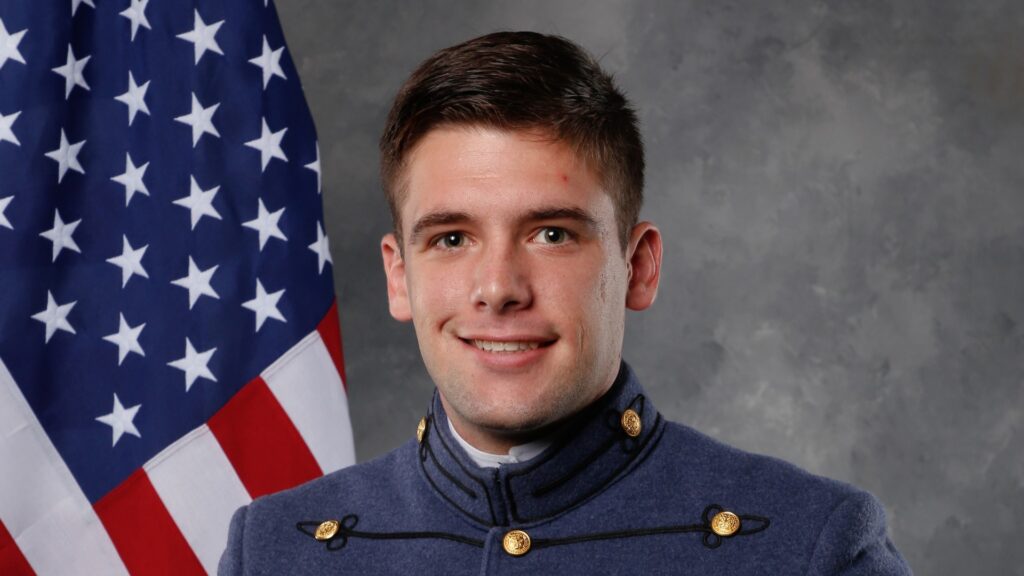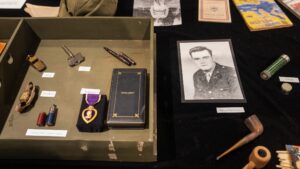
By Catherine Quarles, CGC ’25
When Reece Blackwood, decked out in scrubs, stepped into the operating room at the Medical University of South Carolina, he didn’t know what to expect. Shocked to see that the patient would be awake for the entirety of the procedure, the then senior realized just how much he had to learn about endovascular surgery before the end of the semester.
Blackwood, a business major who graduated in 2021, found himself unexpectedly immersed in the medical field in his Apply Innovations class with assistant professor of Management and Entrepreneurship James Bezjian, Ph.D. The class focuses on exposing students to innovative ideas, processes and solutions to problems through a partnership with MUSC. Doctors with ideas for medical solutions connect with cadets who have the business acumen to create viable products.
Blackwood was paired with Adam Tanious, M.D., who wanted to optimize the operating room with a device to store and organize tools for endovascular surgery. Endovascular surgery is a minimally invasive procedure wherein surgeons use long, thin tubes called catheters to access arteries and veins to treat a variety of vascular conditions.
“The problem is that these catheters can be a little unwieldy,” said Blackwood. “At the longest, a catheter can be around 200 centimeters, and there’s no efficient way to store them.”
Blackwood came up with a device to sanitize, label and organize the long tubes. He created a prototype of the design using a 3D printer in the Tommy and Victoria Baker School of Business Innovation Lab.
Blackwood’s design won the Shark Tank-like competition at the end of the course, that took place at MUSC, where he pitched his product to a panel of judges.
“It was a phenomenal success,” said Bezjian. “It really captured our attention regarding viability and capability in the workforce.”
Blackwood’s success in the competition inspired him to continue forward with the idea. He is currently waiting to secure a design patent for the product, after which he will form a company and begin manufacturing the device to sell to hospitals.
Blackwood’s design didn’t come easy — he sat in on multiple surgeries to better understand the problems surgeons face in the operating room. His experience outside the classroom was pivotal for a successful design.
“I can’t tell you how many times I went through testing with surgical technicians and nurses,” said Blackwood. “When I built the first prototype, we found a lot of issues. It’s like Citadel brass — it starts out rough and then you polish it and polish it until it looks shiny.”
Blackwood credits the class not only as being crucial to his development of the product, but in developing himself as an entrepreneur.
“It was one of the most beneficial things in jumpstarting me,” said Blackwood. “Dr. Bezjian is a great mentor.”
Though Blackwood graduated in May, he has kept in touch with his professor. “When I don’t know what to do, I text him,” said Blackwood. “His experience and knowledge have been a big help.”
Catherine Quarles of Atlanta, Georgia earned her undergraduate degree from The College of Charleston in English, graduating summa cum laude. She is currently working as a graduate assistant in the Office of Communications and Marketing while pursuing a master’s degree in English.

 The Citadel’s Swain Boating Center provides popular event space for Charleston
The Citadel’s Swain Boating Center provides popular event space for Charleston The Citadel Board of Visitors reelects chair
The Citadel Board of Visitors reelects chair The Citadel Museum honors alumnus killed on D-Day
The Citadel Museum honors alumnus killed on D-Day

